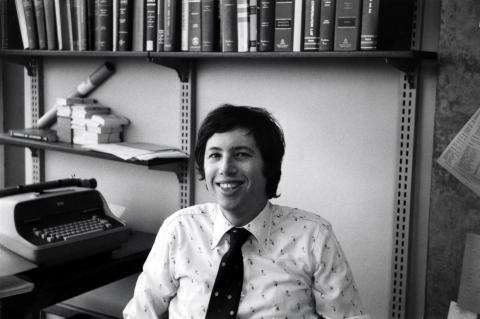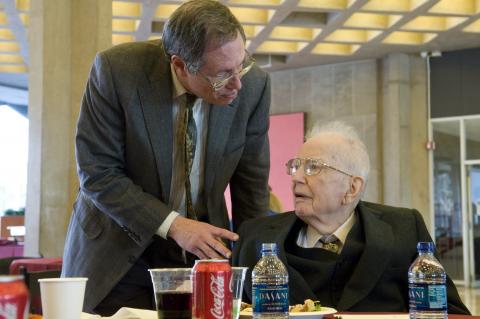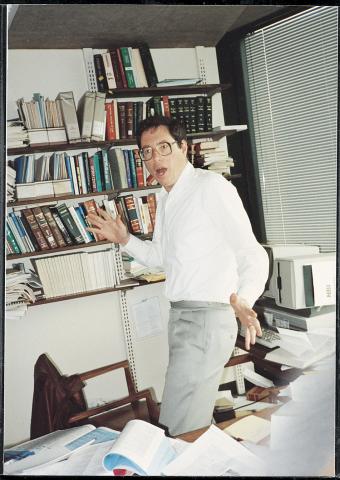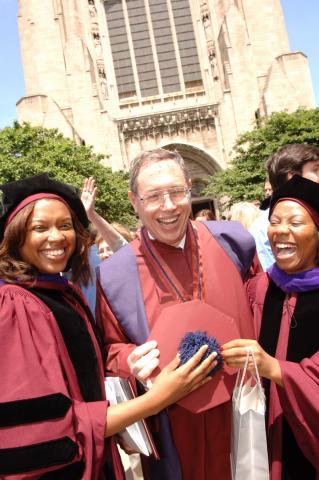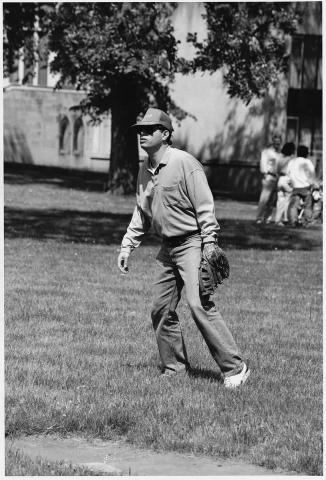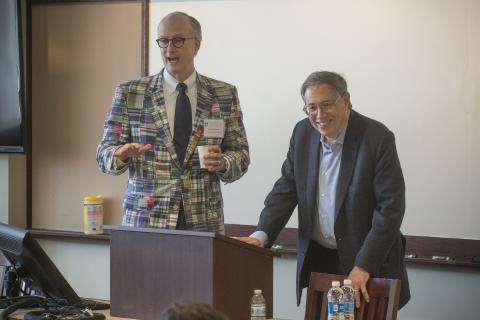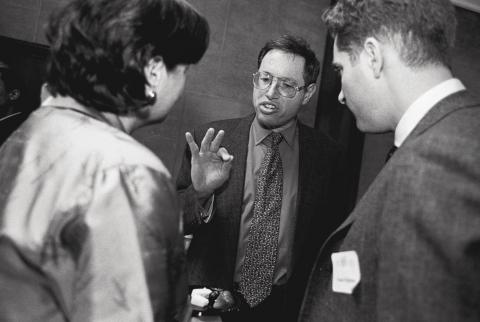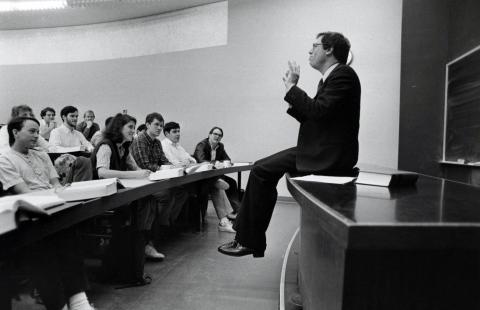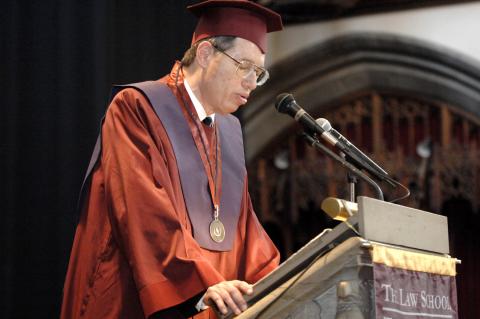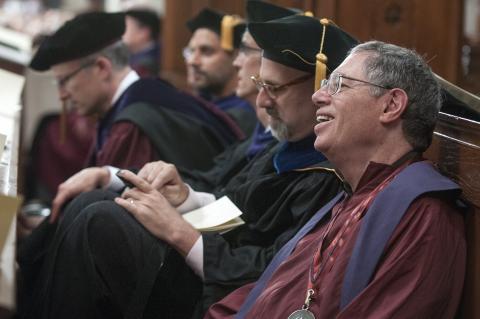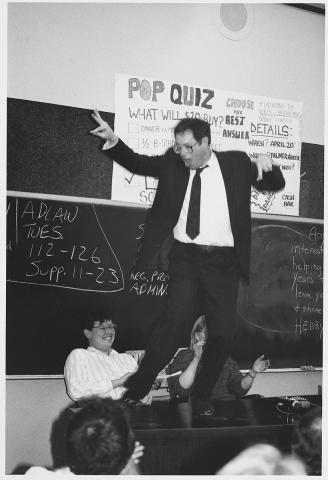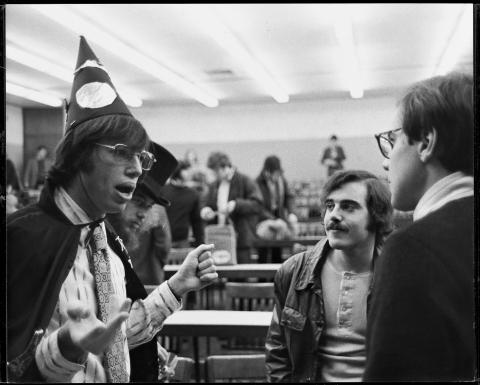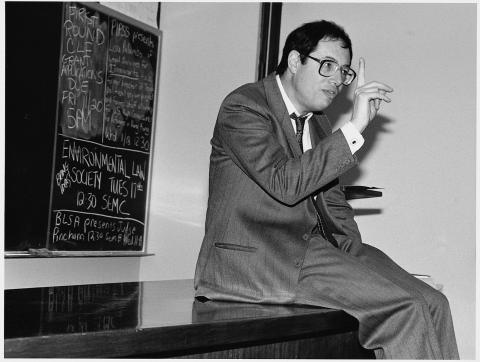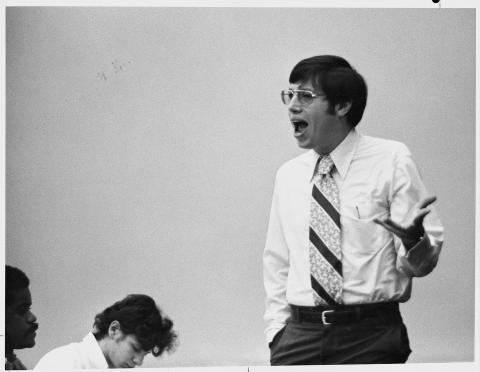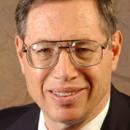Celebrating Richard Epstein
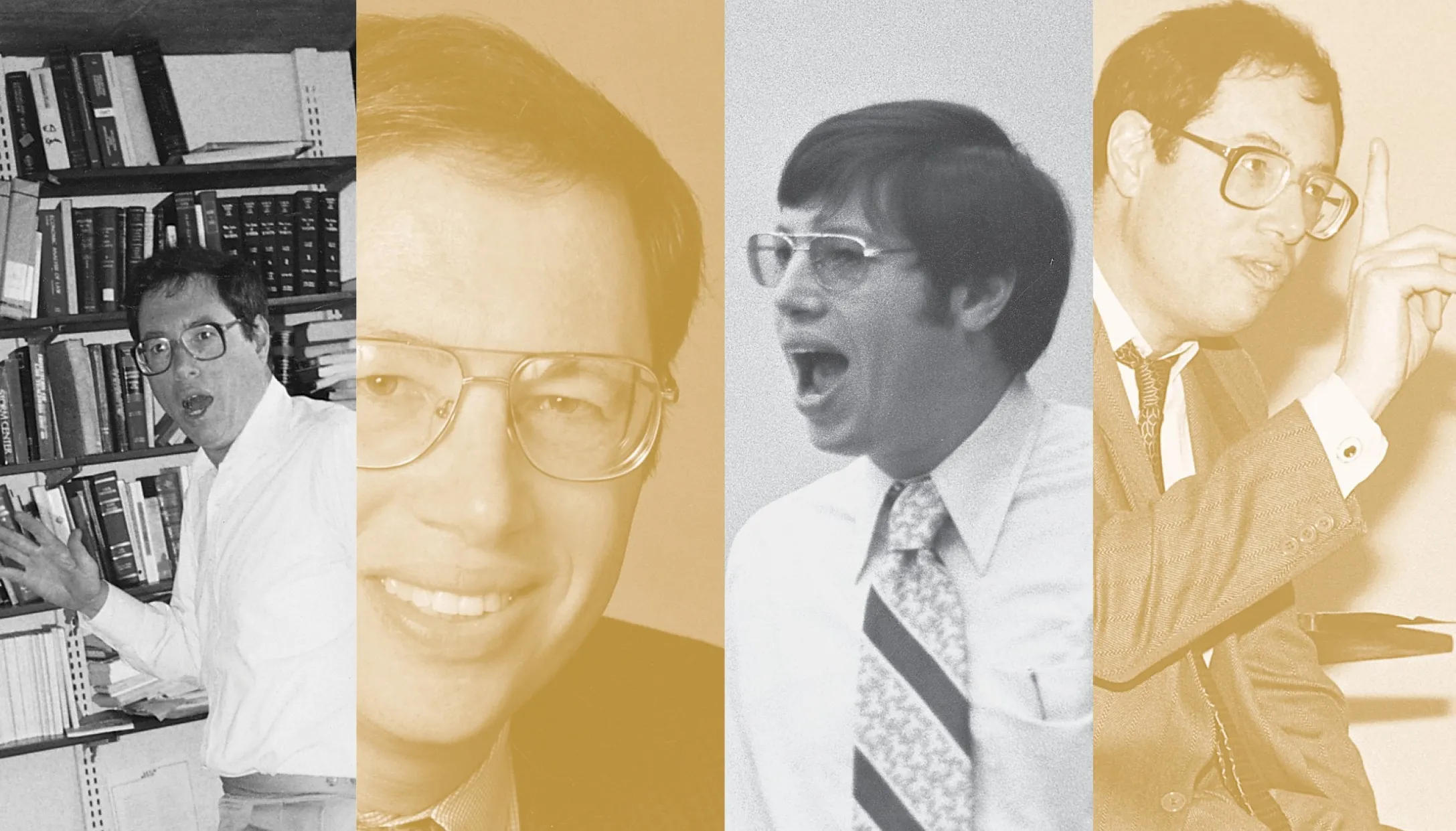
Richard Epstein: professor, mentor, happy warrior, unique thinker, singer, dancer, father, husband, friend. This is the Richard many know and love, the man whose estimated 996 writings and 50 years of teaching have undeniably influenced modern American legal thought—and the man to whom we dedicate this liber amicorum.
This is the beginning of the “book of friends” created to honor the University of Chicago's James Parker Hall Distinguished Service Professor Emeritus of Law—a scholar known not only for his enormous academic contribution but for his kindness, humor, and ability to speak extemporaneously in whole paragraphs.
This weekend, colleagues from around the country will gather at the Law School for a two-day Festschrift conference that will explore many in the long list of legal topics that Epstein has addressed in the past five decades—contracts, legal history, Roman law, intellectual property, takings, administrative law, and more. The two-day event, which begins Friday, is co-sponsored with the NYU School of Law, where Epstein is the Laurence A. Tisch Professor of Law. The book, Liber Amicorum for Richard A. Epstein, will be distributed to all participants.
“Richard’s scholarship is remarkable for its range, erudition, and distinctive voice,” University of Chicago Law School Dean Thomas J. Miles, the Clifton R. Musser Professor of Law and Economics, wrote in an introduction to the book, which was a joint project between the Law School's Coase-Sandor Institute for Law and Economics and NYU Law. “His influence on many areas of scholarship and the law itself is astonishing.”
But there’s another side to Epstein, Miles wrote: “his exceeding generosity as colleague and mentor. Richard has always taken an interest in the next generation and serves as a strong advocate and friend to younger scholars. I am one of a great many who have been fortunate enough to receive Richard’s advice and friendship.”
Born in 1943, Richard spent his early years in Brooklyn, New York, and Great Neck on Long Island. In the early 1960s, he studied at Columbia University, where he ensconced himself in sociology, mathematics, and philosophy and later earned a fellowship that sent him to Oxford University to study jurisprudence. From there, he studied law at Yale and graduated with an LLB in 1968. Richard’s first teaching job was at the University of Southern California. Four years later, in 1972, he moved to the University of Chicago, where he taught full time for 38 years.
Epstein has written or contributed to at least 132 books and four dictionaries. He has written 480 law journal articles, 186 newspaper articles, 125 magazine articles, and 53 working papers. A study published in The Journal of Legal Studies identifies Epstein as the 12th most-cited legal scholar in the 20th century. One study of legal publications between 2009 and 2013 cites Epstein as the third most frequently cited American legal scholar after Erwin Chemerinsky and Cass Sunstein.
As his wife, Eileen Epstein, wrote, “Richard has a multitude of areas of expertise and is interested in almost everything. He never lacks for a topic to think about, to learn from others, or to explain and/or debate. He is known for his nonstop monologues on almost any subject that catches his attention, and the challenge for others is to know when they can interrupt with a question or even introduce a new topic. These characteristics have made him a fascinating spouse—but most of all his kindness and empathy are what have made Richard the best person I can imagine to spend my life with. He is a wonderful father, father-in-law, and grandfather and the best partner in the world."
The 48-page Liber Amicorum for Richard A. Epstein contains 75 essays written by friends, family, and colleagues from across the country that capture both his expansive intellect and his bighearted grace. Here, we offer an excerpt that includes some of the entries submitted by members of the University of Chicago Law School community.
Douglas G. Baird
Harry A. Bigelow Distinguished Service Professor
Many years ago, Richard Epstein invested a lot of energy persuading his colleagues at the University of Chicago to hire a twenty-six-old kid who was four months out of law school. What possessed Richard to do such a thing was never clear, but he succeeded, and I did not wait for them to change their minds. In those days, every aspiring young academic wanted to go to Chicago in order, as one of my professors put it, “to let Richard Epstein battle for your soul.” Richard was the mentor most young academics can only dream of. Trying to take in everything he said was, as one person put it, “like putting a Dixie cup under Niagara Falls.” But even if you took only a fraction of what he said, you could learn how to teach, how to write, and how to think. Richard took me to my first academic conference, he edited my first article, and, through his many acts of kindness, started me on my life’s journey.
William Baude
Neubauer Family Assistant Professor of Law
Richard Epstein is the man of everything.
His scholarship shows how deeply interconnected the law is: Public law rules operate against the backdrop of private law doctrines. Private law doctrines are the manifestations of even more basic principles that endure even across legal systems. Everything in law is deeply connected to everything else.
And Richard’s career shows how important it is to unlock these parts of law from their separate intellectual silos: By researching, writing, teaching, and opining across all aspects of the law, his contributions have a magnifying effect. One man can accomplish much if he sets out to do everything.
Lisa Bernstein
Wilson-Dickinson Professor of Law and Aaron Director Research Scholar
When I was a college student at the University of Chicago in the mid-1980s back when the College really was “The College,” I would sit in Harper Library and fantasize about becoming Richard Epstein. When I went to Harvard Law School, I wrote Richard each year—to no avail I might add—asking to be his research assistant. However, it was not until just after my law school graduation that I met him, after he had offered to publish my student paper in the Journal of Legal Studies. I still hang onto the letter he wrote me on that occasion—it has many gems of Richard wisdom that I like to remind myself of before sending any piece out. He was and remains one of my true academic parents. While much can be said about Richard’s scholarship, I would like to emphasize that Richard was far more than a brilliant scholar, he could also be a brilliant friend. When I finally joined the faculty here I felt like I was joining the University of Epstein as much as I was the University of Chicago—perhaps because in so many respects they are one and the same. In closing I want to reiterate the best of the advice Richard gave me, “Leeza Dear, he said, after five years you must attack your own work with the same vigor with which you attack the work of others,” and “you must never be afraid to leave ideas that don’t fit on the cutting room floor, for if you are in the business for the long haul they will find themselves somewhere else to land.” These principles guide my work to this day.
Mary Anne Case
Arnold I. Shure Professor of Law
One of my first encounters with Richard Epstein was in 1994, when we were on a panel together addressing the question “What is Feminist Legal Theory?” at the Federalist Society’s National Symposium on Feminism, Sexual Distinctions, and the Law at the University of Virginia School of Law, where I was then a member of the junior faculty. Richard, of course, was a regular at Federalist Society gatherings; I was local talent, invited for intellectual diversity and because I was already on site. Richard spoke first, and, as usual, spoke with the utmost of confidence, in an authoritative tone, off the cuff, rapid fire, with a torrent of information and bold categorical claims, in perfectly formed sentences and paragraphs. The trouble with these perfect paragraphs from my perspective was not only that some factual claims contained in them were incorrect, but also that conclusions he claimed followed from them clearly did not. I tossed away all but the first few sentences of my prepared remarks and spent the bulk of my allotted time ripping in to his. When we later published our contributions in the Harvard Journal of Law & Public Policy, I saw that he had made substantial corrections to his argument in direct response to my criticisms, although he had not abandoned his central purpose of urging that feminists pay more attention to sociobiology. In my own contribution, entitled “Of Richard Epstein and Other Radical Feminists,” I followed his advice, concluding on the basis of up-to-date sociobiological evidence that the combination of his “normative libertarian opposition to the elimination of force and fraud and his descriptive emphasis on sociobiology would logically make Epstein a radical feminist.” I doubt that I have yet convinced him of this proposition, but I have observed him over the years since following the logic of argument to other perhaps equally unexpected conclusions. It has always been my sense that he later welcomed me to the University of Chicago Law School, where I have taught since the turn of the millennium, because of and not in spite of the fact that when we first met I had done my best to tear his argument to shreds. For this, and for the many ways in which he inspired me to think harder and inform myself better, and for the wealth of information he has shared over the years, I am grateful.
Frank Easterbrook
Senior Lecturer in Law
Judge, United States Court of Appeals for the Seventh Circuit
Richard Epstein and I have been colleagues at the University of Chicago for almost forty years. During this time he has been the leading libertarian thinker and writer and law, with a deep understanding of economics to influence his proposals. Although legislators and constitution-writers too often have looked in other directions—and courts, bound by their actions and inactions, are compelled to—his writings still inform many and will be influential for decades to come.
To Richard—and to the great work still to come!
Lee Fennell
Max Pam Professor of Law and Ronald H. Coase Research Scholar
I first met Richard in 1999 when I came to Chicago to interview for a Bigelow position. Even though I didn’t know nearly enough to hold up my end of the conversation, I was relieved to find that I didn’t have to! Richard’s generosity of spirit and infectious enthusiasm have been great influences on my development as a scholar. Before meeting Richard, I had not realized how much I could like and learn from someone with whom I often disagreed. I had also not realized that it was possible for someone to speak in entire paragraphs without pausing for air! Richard speaks and writes in exactly the same style, and it is no longer possible for me to read anything that he has written without hearing the words ringing out in his voice. In this way, Richard is always around, even when not physically present at our Law School. I am grateful for this, and look forward to many more in-person interactions in the years to come.
Tom Ginsburg
Leo Spitz Professor of International Law, Ludwig and Hilde Wolf Research Scholar, and
Professor of Political Science
Temporibus molestis, simplicitas in regulis.
—Ricardus Epsteinian (via interpes Googles)
Dick Helmholz
Ruth Wyatt Rosenson Distinguished Service Professor of Law
One of Richard Epstein’s many strengths as a scholar—sometimes overlooked—is his ability as a critic of the written work of others. I know this myself, because he and the late Derek Hall were the best critics of my own work that I can remember. Both were remarkably clear sighted. They put me on the right path, and I have always been grateful for their help.
M. Todd Henderson
Michael J. Marks Professor of Law and Mark Claster Mamolen Research Scholar
One day in 1996, I, a lowly 2L, was eating lunch in the Green Lounge with my future wife, Tara, a medical student across the Midway at the time. In mid-sentence, Richard appeared, holding a plate of hot dogs and looking for a friendly face. I’d had him for a few classes at that point—all my favorites, and all the same class: Richard on Richard on the world—so he pulled up a chair. He had only a few minutes, he told us, as he was just done teaching a class and was headed to give a lunch-time talk. The gun sounded, and he was off.
The topic, lost now to my memory, was obscure. Maybe great Supreme Court decisions of the early 1930s or disastrous ones from the late 1930s. But, whatever it was, I was spellbound. Not just by the recitation of complex doctrine and an encyclopedic command of case law, but by the ability to do it all in perfectly formed, numbered paragraphs, while eating three hot dogs. Few breaths were observable. At one point, I looked over at my lunch date, and saw her mouth agape and her eyes squinted at the spectacle.
When he rose to leave, somewhere between seven and ten minutes later, Tara turned to me and said: “Who was that?!” There had been no introductions, no small talk, no time for anything but law. I was a vessel that wanted to be filled, and so I didn’t insist. And, Richard was a faucet that simply knew nothing other than that purpose. It was not rude. No, far from it. It was the greatest compliment—that he was willing to teach and engage us with his incredible mind.
I think back on this brief encounter often. It reminds me of the reverence I had for Richard as a student, and how there has been no teacher of mine ever who has had such a profound influence on me. Four years at Princeton made me a bit more educated, but three years at Chicago transformed me. Many people had a hand in that, but none close to Richard. In many ways, I was a student at both Chicago and the Epstein School of Law.
It also reminds me of Richard’s many incredible gifts. His passion for law. His love of his students. His accessibility and willingness to share ideas. His tirelessness. His intensity in everything, even the way he eats. And, most especially, the boyish enthusiasm that he brings to his, and my, chosen profession. We need more Richard Epsteins.
My own scholarship and teaching has evolved over time, as I’ve sprinkled my own ideas on top of the cake that Richard helped me bake as a student and young academic. We now disagree about some things. There are now also other stars in my constellation of academic heroes. But Richard Epstein, dear teacher, colleague, and, I’m proud to say, friend, is and will always be my North Star.
Saul Levmore
William B. Graham Distinguished Service Professor of Law
Richard Epstein was the first and best mentor and law journal editor I experienced. Even before I set eyes on him as a visitor to Chicago, he took an idea of mine, and slashed and burned until he made my writing look good, and my argument coherent. He never asked or took a sliver of credit for all the work. This generosity turned out to be a constant. He would dribble out reactions and ideas to others, and all of us knew that to sit next to Richard at lunch, or to get him to read a paper, was a true gift and a sure path to success. He helped those of us who followed him to see what was interesting and what was dull. There are a million Richard stories to tell, but what they have in common is his quirkiness alongside his generosity. That itself was something to learn from him; one could be a believer in markets and yet redistribute without any expectation of repayment in the small corner of the world one occupies. I was lucky to be in his corner.
Anup Malani
Lee and Brena Freeman Professor of Law
Richard is an anchor for both the University of Chicago Law School and for me.
He teaches and writes on an incredibly wide array of subjects—a trait that distinguishes Chicago Law’s approach to both activities. Richard is also above petty politics. Richard’s brand of libertarianism is not at all in vogue. Indeed, at times it elicits mockery rather than substantive response. I profoundly respect that fact that Richard ignores snide comments and engages primarily on substance. In each of these regards he is a role model for scholars that come after him.
Personally, I will remember Richard for having given me my second-lowest grade in law school and yet being instrumental in getting me a clerkship with my now-friend Stephen F. Williams and perhaps even my return to Chicago as a professor. Richard had no reason to look beyond my grade but he did. He got to know me and allowed me to convince him of my case. To this day I consider him a mentor for how to mentor others.
Throughout it all, Richard has been a good personal friend. When I first arrived at Chicago as a faculty member, Saul Levmore invited me to a break-the-fast. I came with my one-year-old son. Although he was a very senior colleague, he took my son off me and told me to mingle and get to know my colleagues. Richard did not have to do that. It is a tribute to his kindness that he knew just then what this junior faculty member needed and was happy to lend whatever helping hand was required. This story, perhaps more than any other, captures for me the essence of Richard as a person.
Richard H. McAdams
Bernard D. Meltzer Professor of Law
The greatness of Richard Epstein cannot be fully appreciated by those who have not been his colleague because he is so warm, generous, and supportive—a great man who happens also to be a great, innovative, and wide-ranging scholar.
Marsha Ferziger Nagorsky
Associate Dean for Communications and Lecturer in Law
Richard Epstein is one of my favorite people on Earth. He was my teacher, and I am now lucky enough to call him my friend. Over the past 25 years, he has tried to teach me (semi-successfully) the history of property law, and I have tried (wildly unsuccessfully) to teach him to sing. He has danced at my wedding, guest-starred with my student a cappella group, and tortured me in the name of education. He is one of the smartest, most erudite, most intellectual people I know—a mentor to me in every way; and yet he turned to me to help him when he was teaching in my area of expertise for the first time. (He knows all the intellectual property theory in the world, but can’t remember the duration of a patent.) Richard is never afraid to speak his mind (in perfectly constructed sentences and paragraphs), but also always excited to learn something new, especially from someone new. I love when he returns to where he belongs in Chicago in the spring, like the swallows returning to Capistrano—it is a breath of fresh air and a sign that all is right with the world. Richard never, ever fails to make me laugh, and he never, ever fails to make me think. I am not sure which is more important, but I am profoundly grateful to him for both.
Jennifer Nou
Neubauer Family Assistant Professor
Whenever researching a new topic, I often think WWRT: What Would Richard Think? It’s rare not to find something he’s written on (my most recent discovery was his thoughts on the relationship between political and corporate executives). For making us all better thinkers—cheers to you, Richard!
Martha C. Nussbaum
Ernst Freund Distinguished Service Professor of Law and Ethics
Law School and Philosophy Department
Richard is that rare thing in the academic life, a true original, going his own way no matter what fashions and trends are doing. It has been so much fun and so exhilarating to be his colleague and to be challenged both by his particular arguments and by his example of fearless independence. Since Catharine MacKinnon is not in this booklet, let me mention something great she said about Richard. Asked whether she was not uncomfortable as a radical feminist in the University of Chicago Law School, she answered, not at all. “Because Richard does his thing, and I do my thing.” In other words, having a true original ensconced in the institution gives a new maverick permission to be herself.
Another great thing about Richard is his tireless zest and friendliness. He always likes to engage, especially where there is disagreement, and he does so with joy and real curiosity. I’ve so often had the fun of debating with him, and it is always a reciprocal learning occasion. A recent law-philosophy postdoc of ours, Amanda Greene, wrote a note of thanks to the Law School in which she singled out the pleasure of having Richard stop into her office and ask her what she was working on. We’ve all had that pleasure, and look forward to a lot more.
Eric Posner
Kirkland & Ellis Distinguished Service Professor of Law and Arthur and Esther Kane Research Chair
Richard is the Happy Warrior of the legal academy, and we are all better for it:
Who, whether praise of him must walk the earth
For ever, and to noble deeds give birth,
Or he must fall, to sleep without his fame,
And leave a dead unprofitable name—
Finds comfort in himself and in his cause;
And, while the mortal mist is gathering, draws
His breath in confidence of Heaven’s applause:
This is the happy Warrior; this is he
That every man in [law] should wish to be.*
* from the original “Character of the Happy Warrior” by William Wordsworth
Geoffrey R. Stone
Edward H. Levi Distinguished Service Professor of Law
I first met Richard in January of 1973 when I returned to the Law School (from which I graduated in 1971) to interview for a position on the faculty. In that first encounter, I was dazzled. “Who is this guy, who is so obviously brilliant?” Richard was there that year as a Visiting Professor. We have been friends and colleagues ever since. Although Richard and I disagree about many, if not most, legal issues, I have always had the highest respect and admiration for him as a legal thinker and scholar. He is interested in everything, never stops thinking, and even when patently wrong, his ideas and perspectives are insightful, challenging, and daring. In my endless and always stimulating conversations with Richard over the past 45 years about such topics as free speech, equality, privacy, national security, and constitutional interpretation, I always learn a great deal, and Richard would no doubt be surprised at how much his ideas and arguments have influenced my own teaching and writing—even if I’m rarely persuaded.
Richard has also been an extraordinary member of our Law School community. Not only as a dominating intellectual presence, but also as an always active and lively participant in workshops, faculty Roundtable lunches, and as a commentator on papers. Indeed, over the years Richard has helped to shape the extraordinary intellectual life that now is the University of Chicago Law School. For that, I—and all of my colleagues—will always be grateful.
And speaking of gratitude, as a leader of the University’s Faculty Senate, Richard spearheaded the decision of our University to extend marital benefits to same-sex domestic partners at a time when this was truly revolutionary. It might surprise people who have a caricatured image of Richard, but his leadership on this issue was not only bold and courageous, but consistent with his intellectual and ideological beliefs. It was a remarkable moment for our University and for higher education generally.
It goes without saying that Richard’s scholarship over the decades has had a profound impact on the intellectual debates in our nation and throughout the world. His writing has consistently inspired responses that have deeply enriched the thinking of even those who disagree with them. He is in spirit and in action the very embodiment of the “marketplace of ideas.”
Finally, I should add that I have treasured Richard as a friend over these many years. We have seen our kids grow up, our families have been close, and he has been a caring and thoughtful advisor to me across a broad range of difficult moments, from the professional to the personal. He is and always will be one of my dearest and most treasured friends.
Lior Strahilevitz
Sidley Austin Professor of Law
My first exposure to Richard Epstein was as a 1L, when seemingly every other page in my Torts and Property casebooks contained the words, “But see Richard A. Epstein...” And sometimes the positions described in the parentheticals that followed those citations seemed outlandish. A little later in law school there was an announcement that Professor Epstein would arrive on campus to debate Bruce Ackerman, and the student body largely regarded this as a lightsaber duel between Darth Vader and Luke Skywalker. The debate audience in the auditorium was stacked with Ackerman partisans, but I remember that at one point in the debate I thought to myself, “What Epstein just said makes sense” and because Yale wasn’t Chicago I immediately realized I needed to keep that blasphemous thought from my classmates. By the time I started reading Richard’s work for myself I discovered that his positions were far more nuanced and elegant than the casebook parentheticals generally made them seem.
I met Richard for the first time when I came to Chicago to interview for an assistant professorship. Richard was the only professor I can recall asking me about a student case note I’d written, which involved the Takings Clause. Richard asked me to explain my thesis and I did. After a short pause, he announced, “I actually agree with that.” And I said: “You do?” It was one thing for me to agree with Epstein secretly in an auditorium and another thing entirely for him to agree with me loudly. But then I consulted his book on takings and realized that we did indeed agree on those particulars. And he had seen the light when I was still twelve years old. It turns out that my case note was missing a deserved “See Richard A. Epstein” citation!
In the years since our first conversation, I’ve come to agree with Richard about some important things, like zoning, though I’ve stubbornly refused to convert on most of takings law and several of our shared subject matter interests. I have come to value immensely his warm friendship, his insights into people, and his generosity with colleagues and students alike. I leaned heavily on his unmatched knowledge of the law the first time I was teaching Property, and his patient guidance saved me from critical mistakes more than once. I was deeply honored to have Richard chair my tenure committee and to claim the Law School office in which he had written books and articles that people will still be reading a century from now. And I fondly remember the impish grin he shot me when he told me who he had inherited the office from in the 1980’s: Richard Posner. No pressure, kid.
David A. Strauss
Gerald Ratner Distinguished Service Professor of Law
Those of us who disagree with Richard owe him a special debt. His arguments are so coherent and forceful—and are made in such a spirit of rigor, intellectual honesty, and collegial engagement—that he forces you to improve your own reasoning and to acknowledge vulnerabilities in your position. Once you have had to grapple with what Richard says, you don’t think about things in the same way anymore, even if you end up in the same place.
All of this is of a piece with the way Richard has been as a colleague. Richard was instrumental in maintaining the egalitarian culture at the University of Chicago Law School. He never pulled rank; I can’t imagine Richard acting as if he was entitled to deference because of his extraordinary stature as a scholar. He jumps in and engages on an equal footing with anyone, especially if their arguments are bold and counter-intuitive, and even if he completely disagrees. He is impatient only with people who seem to be lazily resting on their reputations, or to have sacrificed intellectual rigor for political advantage, even, in fact especially, if they are politically on his side of the fence.
As a person Richard is instinctively generous. He understood at a deep level that in a law school, as in any institution, you’re dealing with human beings, with all of their complexity and challenges and need to be treated with charity. And if you were looking for help—with finding a doctor, or getting advice about teaching, or pretty much anything—you could always go to Richard. It was, and is, a privilege to be his colleague.
Online excerpt and photos compiled by Becky Beaupre Gillespie, Claire Parins, and Claire Stamler-Goody.
